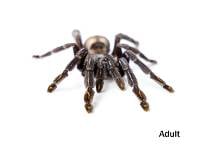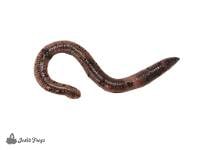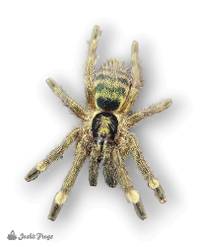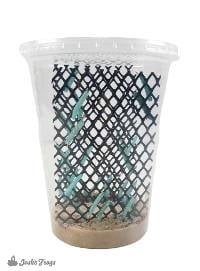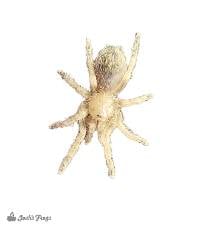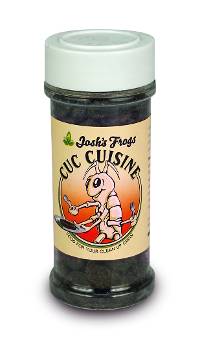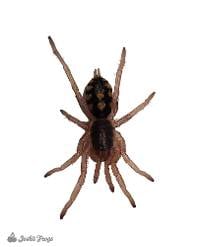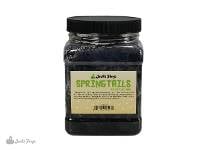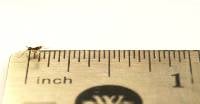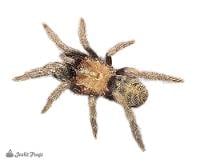Josh's Frogs
Trinidad Olive Tarantula (Gold)- Neoholothele incei (Captive Bred)
Trinidad Olive Tarantula (Gold)- Neoholothele incei (Captive Bred)
$29.99 5.0 out of 5 stars
(1)
5.0 out of 5 stars
(1)About This Product
SPECIAL NOTE: USPS forbids shipping venomous spiders or scorpions in the mail.
Because of this, we ship these animals FedEx priority overnight for a flat fee of $39.99.
Defining Characteristics:
- An absolutely beautiful dwarf species from Trinidad, this is one of the few species of tarantula that comes in two entirely distinct color forms.
- A small tarantula with big webbing, this spider will cover its entire enclosure in web tunnels in the blink of an eye.
- One of the few species that has been observed to be communal in nature, a group set up of these will quickly result in a webby wonderland if you don’t mind the possibility of babies.
- A fast growing species, these little guys will reach adult size in 2 years or less in a lot of cases.
Name: Neoholothele incei or “Trinidad Olive” is a small species of tarantula whose name has Greek roots that are somewhat ambiguous, it is possible that the name alludes to the suffix -sthele, which would give the genus name the meaning of “New complete strength” or “new complete energy” but literally translated, it means “new complete nipple.” It’s possible that incei refers to a person or a place.
Enclosure Size: This species are opportunistic burrowers, as babies a dram vial or pill bottle large enough to give them 1.5-2 inches of substrate to burrow in is appropriate for quite some time. As the little ones grow into adults they will need closer to 3-4 inches of substrate. For floor space 3-4 times the spider’s diagonal leg span for both length and with is appropriate, just make sure that the space above the substrate does not exceed 2 times the spider’s diagonal leg span to prevent injury from a fall.
Want to spice up your enclosure with live plants? Our experts have curated kits of easy-to-care-for and SAFE plants for your tarantula. Check them out here!
Temperatures: A comfortable range for them is between 76-82°, temperatures consistently 5 or more degrees outside of this range should be avoided for long term safety of the spider.
Humidity: 65-75%, This can be achieved by keeping 1/3 of the enclosure moist but not soaked.
Size: Specimens will be at least 3/4 inch. Adults will top out at 2.5-3 inches.
Age: At least 5 months at time of sale. Females will live between 5-7 years usually, with males averaging around 2 years.
Feeding: At time of sale specimens are eating hydei fruit flies. Babies should be fed every 4-7 days, as they age into adults that should be spread to every 7-10 days. Prey should be the size of the spider’s carapace or smaller. Never attempt to feed a freshly molted tarantula less than a week after their molt to prevent injury to the spider.
Sexing: Due to age, Neoholothele incei sold by Josh's Frogs are sold as unsexed. As they approach maturity, specimens may be sexed using a molt, due to the small nature of this spider molt sexing may require a magnifying glass. Females will have spermatheca and a uterus externus between the top set of book lungs that will catch and "flap" if a pin is run down the inside of the abdomen. Males will have a much more plain slit that does not budge with attempts to manipulate it.
Coloration/Patterning: Olive Neoholothele incei babies are dark bodied with light pinkish legs, as they molt to adults they turn a wonderful metallic olive color with a black starburst on the carapace and a black chevron pattern on the abdomen.
Gold Neoholothele incei babies are an all over light pink color, as they grow into adults they turn a stunning orange gold, with a subtle but still present orange starburst on the carapace and chevron pattern on the abdomen.
Social Behavior: Neoholothele incei can be kept communally under certain circumstances. Success in keeping this species together requires research, the correct habitat, and at least 4-5 individuals. This species can be kept alone and that is the safest way to keep them.
Breeding: Spiders for breeding purposes should remain supervised when together and should only be attempted well fed. Mature males can be put in the enclosure of a mature female for courtship/mating. Remove male promptly after insertion is observed, or immediately if female is aggressive rather than receptive. This is best done around a month after the female molts, as a freshly molted female is less likely to molt out of a pairing.
Natural Range: Neoholothele incei can be found in Trinidad as their common name suggests.
Links of Interest:
- Arachnoboards: a community of spider enthusiasts that will be able to or have already answered almost any question you can think of with regards to tarantulas.
Still not sure if the Trinidad Chevron Tarantula from Josh's Frogs is the right pet bug for you? Read the reviews below and see what other customers are saying!
Shipping
After placing an order containing a live animal, you will receive a scheduling email containing our JotForm scheduling link to schedule your new pet's delivery date.
With this scheduling link, you will be able to schedule your order's delivery up to 30 days in advance. You will be able to choose a date of delivery for Tuesday-Saturday (Saturday arrival depends on the carrier's service availability) with the estimated time of arrival generally being 12pm, or 4:30pm for more rural areas. Overnight lows must be above 40°F to ship directly to you (or above 30°F for FedEx Ship Center pickups) as well as below 90°F by estimated time of arrival.
If you require further assistance, or prefer to talk to one of our Customer Service agents, please feel free to reach out to our [email protected] email or our phone line 1-800-691-8178.
Other Customers Also Bought
Customer Reviews
5.0 out of 5 stars
Based on 1 review
Review data
5 star reviews
- 100%
4 star reviews
- 0%
3 star reviews
- 0%
2 star reviews
- 0%
1 star reviews
- 0%
Reviews
Sabrina
5.0 out of 5 stars
Beautiful Slings
The three I purchased are now doing well and they eat extremely readily. They are very quick so be mindful not to keep their lid open while doing maintenance or it might decide to have a stroll. Mine were a touch thin which is understandable since I'm sure there's tons to care for. They had no hesitation in taking down a good sized dubia each within a few hours of arrival. All are now getting chunky and webbing their deli cups to their heart's content. Beautiful pink and goldish coloration, excited to see it intensify with subsequent molts.
Showing 1 to 1 of 1 results

